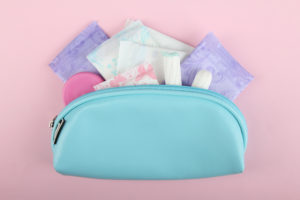Tampon Safety Tips
 Most women who have handled a box of tampons have come across the words “toxic shock syndrome” (TSS) without spending much time contemplating tampon safety. This rare, but potentially life-threatening, condition is caused by bacterial infections, mainly the Staphylococcus Aureus or the Streptococcus bacteria. TSS is mostly associated with the use of tampons as it is thought that the bacteria thrive in the presence of a super-absorbent tampon. Possible symptoms include high fever, rash on the palms and soles, low blood pressure, vomiting or diarrhea, muscle aches, headaches, disorientation, and redness of the mouth, throat and eyes.
Most women who have handled a box of tampons have come across the words “toxic shock syndrome” (TSS) without spending much time contemplating tampon safety. This rare, but potentially life-threatening, condition is caused by bacterial infections, mainly the Staphylococcus Aureus or the Streptococcus bacteria. TSS is mostly associated with the use of tampons as it is thought that the bacteria thrive in the presence of a super-absorbent tampon. Possible symptoms include high fever, rash on the palms and soles, low blood pressure, vomiting or diarrhea, muscle aches, headaches, disorientation, and redness of the mouth, throat and eyes.
Although TSS can affect anyone, most cases caused by the Staphylococcus bacteria occur in women of menstruating age, followed by cases occurring in older women, children, and men. As far as tampon use is concerned, use of super-absorbent tampons, as well as use of tampons when there is low blood flow, may be increasing the risk of TSS.
To reduce the risks of TSS, focus on these tampon safety tips:
- Change tampons every few hours
- Avoid tampons with applicators, as they increase the danger of scraping the vaginal walls
- Be gentle when inserting and/or removing tampons
- Avoid using tampons overnight or when the flow is light
- Maintain personal hygiene during your period and thoroughly wash your hands before and after handling tampons
- Use tampon immediately after unwrapping and avoid handling more than necessary
- Do not use tampons if you are not on your period
In addition to TSS, tampons can also expire. Some companies may provide an expiry date on the tampon boxes, but that may not always represent the life cycle of the tampons. You may hear that the shelf life of a tampon is about five years, but this comes with certain requirements.
To be safe when using tampons, consider the following:
- Tampons are sanitary, but not sterile
- If there’s no expiration date, write the purchase date on the box
- Always keep tampons in their original packaging and away from excessive moisture, as this reduces the risk of contamination
- The bathroom is NOT the best place to store your tampons: find a cabinet that’s cool and dry
- Don’t let tampons loose in your purse—to avoid ripping the packaging store tampons in a small bag or pouch
- Remember that debris, dust, dirt, and/or mold are not always visible; if the packaging has been ripped or if you have stored tampons in less-than-ideal conditions, it is best to not use them
- Do not use a tampon if there’s noticeable discoloration, mold patches and/or odor
